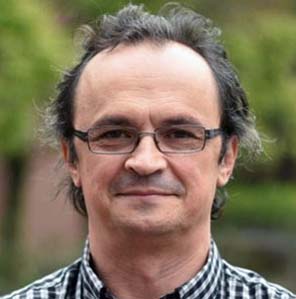John Mak
January 2025
-
June 2026
Building on the Spark-funded 2024 CHLOROXEA campaign, this work aims to determine whether there exists a wintertime removal of methane in the tropical western Atlantic atmosphere that relies on the presence of iron-rich aerosol aloft. Exploring whether the mineral dust-sea salt aerosol (MDSA) removal mechanism utilizes continental dust or other iron-rich aerosol, such as that from biomass burning or anthropogenic combustion, will advance understanding of conditions where natural methane removal occurs.

John E. Mak is an earth scientist who has worked primarily in the fields of atmospheric chemistry and biogeochemistry. He earned a BS in Chemistry from UC Irvine, a PhD from Scripps Institution of Oceanography, and was then a DOE Global Change Postdoctoral Fellow before joining the faculty at the School of Marine and Atmospheric Sciences at Stony Brook University, where he is a full professor. Over the past fifteen years, John also has led an effort under a private entity (UltraPure Air, LLC) for research and development that specializes in novel applications for airborne research. To support this endeavor, Mak is a commercial pilot and drone pilot with a couple thousand hours’ flight time. Over the past two-plus decades Mak has led various research efforts funded by the National Science Foundation, NOAA, and EPA, and now is very excited to be working with Spark Climate on CHLOROXEA.


Daniel Knopf is a professor of in the Department of Chemistry at Stony Brook University. He earned his Ph.D., in 2003 from the Swiss Federal Institute of Technology. His research focuses on the physical and chemical properties of aerosol particles and their interaction with the atmosphere. Aerosol particles play a key role in air pollution, cloud formation, and global warming.


Dr. A. Laskin obtained his Ph.D. degree in 1998 from The Hebrew University of Jerusalem, Israel, where he studied the kinetics and mechanisms of the high temperature pyrolysis of aromatic compounds. In 2017, Dr. A. Laskin joined Department of Chemistry at Purdue University as a full Professor. The research activities Dr. A. Laskin are focused on analytical and physical chemistry of aerosols. His group investigates changes in chemical and physical properties of particles as they evolve due to their multi-phase reaction chemistry in laboratory and field experiments.


Dr. Delphine Farmer is Assistant Professor, Department of Chemistry at Colorado State University. Her research focuses on combining instrument development and advanced analytical chemistry, with atmospheric science and physical chemistry, to understand air pollution and climate-relevant processes.


Dr. Róisín Commane is an atmospheric chemist interested in the exchange of traces gases between the surface of the earth and the atmosphere above it. Her work includes measuring carbon fluxes in ecosystems from the tropics to the Arctic and cities like NYC, and using trace gases to understanding the drivers of various processes in these environments.


Professor Mahowald had positions at the University of California, Santa Barbara and the National Center for Atmospheric Research (NCAR) before joining Cornell as a faculty member in 2007. Her research group is focused on understanding feedbacks in the earth system that impact climate change. This includes global and regional scale atmospheric transport of biogeochemically important species such as desert dust, as well as the carbon cycle. They look at these issues through a combination of 3-dimensional global transport and climate models, as well as analysis of satellite and in situ data. She has served as a lead author on two Intergovernmental Panel on Climate Change (IPCC) reports and is currently deputy Principal Investigator (PI) on the Earth Surface Mineral Dust Source Investigation (EMIT) from the National Aeronautics and Space Administration (NASA).


Peter Hess is a Professor in the Department of Biological and Environmental Engineering. His research interests focus on understanding atmospheric chemistry within the context of the Earth's climate system. His work will advance understanding of how the chemistry and composition of the atmosphere may change over the 21st Century and help to prepare adaptive responses or mitigation strategies. These changes in atmospheric chemistry not only drive climate change but also directly threaten human health, agricultural productivity, and natural ecosystems.


Thomas Röckmann is a leading specialist in the development and application of innovative isotope techniques to atmospheric research. His group operates a large and innovative atmospheric chemistry laboratory specialized in isotope ratio measurements on numerous trace species. His research covers a wide field of applications with isotope studies, e.g. global trace gas budgets, detailed kinetic isotope effects, impact of anthropogenic activities on the atmosphere or stratosphere-troposphere exchange.

Menu
Stay in touch
Sign up to our Spark newsletter and stay updated!